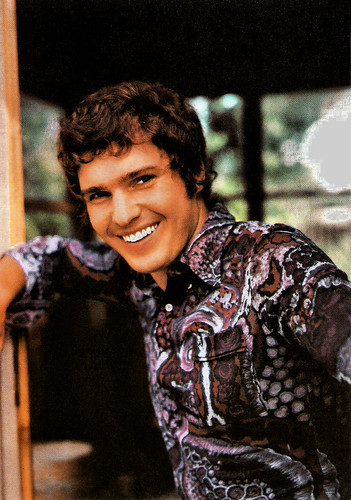
German autograph card by VEB Lied der Zeit, Berlin. Photo: Günter Linke.
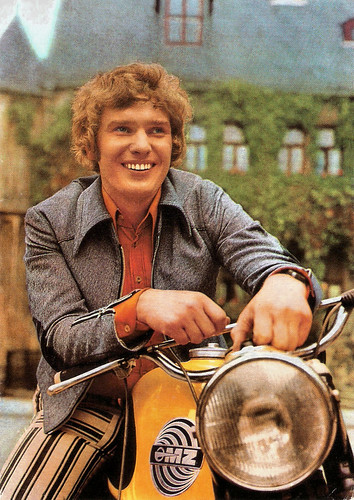
East-German postcard by VEB Progress Film-Vertrieb, Berlin, no. 7/F/73. Photo: Schwarz.

Big East-German card by VEB Lied der Zeit, Musikverlag, Berlin, no. 419-440/A 504, 1973. Photo: Günther Lincke, Berlin.
Looky Looky
Frank-Lothar Schöbel was born in 1942 in Leipzig, Germany. He was the second son of the opera singer Käthe Brinkmann.
His musical talent was discovered early on. As a seven-year-old, he attended the preparatory course for the Thomanerchor (St. Thomas' Choir) in Leipzig. But instead of joining the choir, he was more interested in pop music.
He completed an apprenticeship as a mechanic and began his musical career in the Erich Weinert Ensemble of the Nationalen Volksarmee (National People's Army - NVA). In 1962, Schöbel started his career as a musician in the GDR.
In 1964 he produced his first single and at the end of the year took first, second and fourth place in the GDR charts with 'Looky Looky', 'Blonder Stern', and 'Party Twist'.
He also appeared as a presenter and entertainer in television shows and played in DEFA films, such as Reise ins Ehebett/Journey into the Nuptial Bed (Joachim Hasler, 1966) with Anna Prucnal and Eva-Maria Hagen, Hochzeitsnacht im Regen/Wedding Night in the Rain (Horst Seemann, 1967) with Traudl Kulikowsky, and the musical Heißer Sommer/Hot Summer (Joachim Hasler, 1968) with Chris Doerk, at the time his wife.
Heißer Sommer was one of the biggest box-office hits in the history of East-German cinema. He and Doerk twice won the GDR Schlager competition, in 1967 with 'Lieb mich so, wie dein Herz es mag' (Love me as your heart likes it) and in 1969 with 'Abends in der Stadt' (Evening in the city).

East-German postcard by VEB Progress Film-Vertrieb, Berlin, no. 2.436, 1966. Photo: Helmut Raddatz. Frank Schöbel in Reise ins Ehebett/Journey into the Nuptial Bed (Joachim Hasler, 1966).
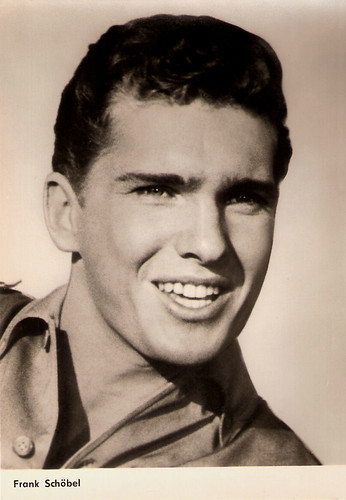
East-German postcard by VEB Progress Film-Vertrieb, Berlin, no. 2508, 1965. Photo: DEFA / Kroiss. Frank Schöbel in Reise ins Ehebett/Journey into the Nuptial Bed (Joachim Hasler, 1966).

East-German postcard by VEB Progress Film-Vertrieb, Berlin, no. 2510, 1965. Retail price: 0,20 MDN. Photo: Kroiss / DEFA. Frank Schöbel and Anna Prucnal in Reise ins Ehebett/Journey into the Nuptial Bed (Joachim Hasler, 1966).
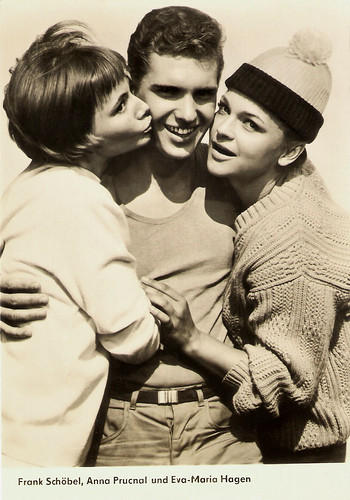
East-German postcard by VEB Progress Film-Vertrieb, Berlin, no. 2511, 1965. Retail price: 0,20 MDN. Photo: Kroiss. Frank Schöbel, Anna Prucnal and Eva-Maria Hagen in Reise ins Ehebett/Journey into the Nuptial Bed(Joachim Hasler, 1966).
Don't cheat, darling!
In 1971 Frank Schöbel had his first big success in both East- and West-Germany with 'Wie ein Stern' (Like a star). The East German record label Amiga sold 400,000, the West German Philips label over 150,000 singles.
Schöbel was then invited to the program Musik aus Studio B by NDR and was the first GDR pop singer to appear in the Federal Republic of Germany. In May 1989 he achieved another success when the song 'Wir brauchen keine Lügen mehr' (We don't need any more lies) reached position 80 in the West-German airplay charts.
Schöbel and Doerk returned to the cinema with another musical Nicht schummeln, Liebling!/Don't cheat, darling! (Joachim Hasler, 1972), but it was less successful than their hit film Heißer Sommer/Hot Summer (1968).
Schöbel performed at the opening ceremony of the 1974 World Cup in the Federal Republic of Germany as a representative of the GDR in the Frankfurt Waldstadion. In 1975 Schöbel sang together with his colleague and partner Aurora Lacasa on the Ernst-Thälmann-Insel, which belongs to Cuba.
They performed the song 'Insel in the Golf of Cazones' for the GDR television program Unterwegs mit Musik - Kuba (1975). Very popular was his children's album 'Komm wir malen eine Sonne' (Come on, let's paint a sun) in 1975.

East-German postcard by VEB Progress Film-Vertrieb, Berlin, no. 2.668. Photo: Helmut Raddatz / DEFA. Frank Schöbel in Reise ins Ehebett/Journey into the Nuptial Bed (Joachim Hasler, 1966).

East-German postcard by VEB Progress Film-Vertrieb, Berlin, no. 2812, 1967. Photo: Blümel. Frank Schöbel in Hochzeitsnacht im Regen/Wedding Night in the Rain (Horst Seemann, 1967).
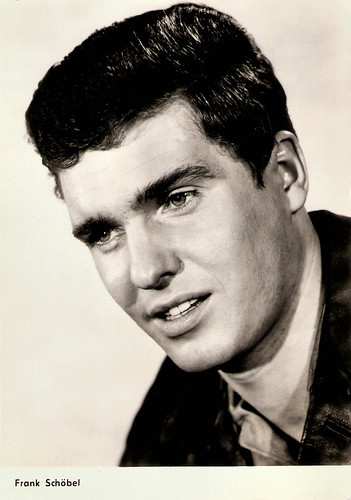
East-German postcard by VEB Progress Film-Vertrieb, Berlin, no. 2856, 1967. Photo: Blümel. Frank Schöbel in Hochzeitsnacht im Regen/Wedding Night in the Rain (Horst Seemann, 1967).

East-German postcard by VEB Progress Film-Vertrieb, Berlin, no. 3130, 1968. Retail price: 0,20 MDN. Photo: Raddatz. Frank Schöbel in Heißer Sommer/Hot Summer (Joachim Hasler, 1968).
The Lives of Others
In 1985, Frank Schöbel and Aurora Lacasa, together with their two daughters, recorded the LP 'Weihnachten in Familie' (Christmas with Family). It became the best-selling album in GDR history.
In the East-German gay film Coming Out (Heiner Carow, 1989), Frank Schöbel's songs 'Wie ein Stern'(Like a Star) and 'Gold in deinen Augen' (Gold in Your Eyes) are played in a scene in the pub, Zum Burgfrieden.
In the Oscar-winning film Das Leben der Anderen/The Lives of Others (Florian Henckel von Donnersmarck, 2006), Schöbel's song 'Wie ein Stern' is played as background music in a scene in an East Berlin restaurant, which characterises the popular music scene in the GDR in the 1980s.
Frank Schöbel was married from 1966 till 1974 to the pop singer Chris Doerk, and they have a son, Alexander Schöbel. After their divorce, he lived from 1975 till 1996 with Aurora Lacasa. They have two daughters, Dominique and Odette. Dominique is also successful as a singer. In 2002 Schöbel's daughter Liv Cosma was born.
Frank Schöbel published a memoir, 'Frank und frei. Die Autobiographie', in 1998. In 2011, he released the single 'Hautnah und Sehnsucht nach Heim' and in 2016 the cd 'Unvergessen - die Hits unserer Herzen'. Every year Frank Schöbel goes on a big Christmas tour through East Germany.
Schöbel lives in Berlin-Mahlsdorf and has set up a small recording studio there. He plays in the over-70 soccer team of BSV Eintracht Mahlsdorf. To date, Frank Schöbel has composed over 350 songs, sang more than 600 songs, and wrote around four dozen lyrics. His DEFA film Heißer Sommer/Hot Summer (1968) enjoys now cult status in Germany.

East-German postcard by VEB Deutsche Schallplattenverein DDR, 1972. Photo: Helmut Raddatz.

East-German postcard by VEB Bild und Heimat Reichenbach i.V., no. G 6599, 1973. Photo: T. Leher, Berlin.

East-German postcard by VEB Progress Film-Vertrieb, no. Ag 500/1a/1973. Photo: DEFA / Goldmann. Frank Schöbel and Chris Doerk in Nicht schummeln, Liebling!/Don't cheat, darling! (Joachim Hasler, 1972).

German autograph card, no. Bg 056/82/85.
Sources: frank-schoebel.de (German), Wikipedia (German and English), and IMDb.
No comments:
Post a Comment